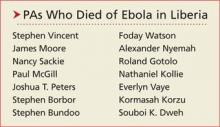In November 2012 and January 2014, I traveled to Liberia to conduct a needs assessment of the health care system there on behalf of a company that was interested in supporting efforts to rebuild the country’s infrastructure. I discovered that the physician assistant profession has been in existence in Liberia since 1965—the same year that it started in the United States.
During my time in Liberia, I became close friends with Jerry Kollie, PA, President of the Liberia National Physician Assistants Association (LINPAA). I recently interviewed him to learn more about his organization and the PA profession in Liberia, where they have spent almost a year and a half dealing with the worst Ebola virus outbreak in history.
Editor’s note: The following excerpt focuses on the Ebola outbreak. Please visit our website ( http://bit.ly/1NgHX2Q) to learn more about the PA profession in Liberia.
John Oliphant: What impact has the Ebola epidemic had on PAs’ clinical practice in Liberia?
Jerry Kollie: The Ebola epidemic has had a serious impact on us in many ways. It created fear among many PAs about continued clinical practice. Some of our students have lost interest in the profession for fear of contracting the virus and dying after graduation.
Workforce is also an issue. Training has been delayed, which means there are fewer PAs available in the various health facilities providing services to people. Many PAs died and others were ill with Ebola, which increased the workload in our health facilities.
The outbreak also created fear among patients; many of them stopped going to health facilities for care. As a result, PAs would go to work and not see any patients.
JO: Do you know how many PAs in Liberia lost their lives due to Ebola? And how many contracted the virus but survived?
JK: A total of 26 PAs were affected by Ebola virus disease. Many contracted the virus at their workplaces and were taken to various Ebola Treatment Units (ETUs), where some died while others survived. Of the total number, 14 died (see box on page 42 for a list of their names), nine survived, and three were quarantined but did not contract the virus. Those three PAs spent 21 days in quarantine after unknowingly attending to patients who were later confirmed to have Ebola. As God would have it, they all went through the quarantine without experiencing or developing signs or symptoms.
JO: What has been your greatest leadership challenge as the President of LINPAA during the Ebola epidemic?
JK: My greatest challenge was the stress of responding to the demands of PAs who were in the various ETUs seeking medical care; responding to the numerous calls from family members, relatives, and friends wanting me to advocate for their well-being; creating awareness and informing other PAs of the status of their colleagues; and also informing the world at large of the situation we were in. I had many sleepless days and nights, with most of those happening in the months of August, September, and October 2014, when I could not sleep at my own house. I just kept moving from one ETU, radio station, or office to another, advocating and soliciting assistance for the well-being of the health care providers—especially for PAs.
Continue for the aftermath >>
AFTERMATH
On May 9, 2015, the World Health Organization declared Liberia free of Ebola after 42 consecutive days without a new case. That changed on June 29, when Liberia experienced its first new case of Ebola virus since March 20.
In the neighboring countries of Guinea and Sierra Leone, Ebola cases are still regularly occurring (although fewer than at the peak of the outbreak).
As of August 19, 2015, 880 health care workers have become infected with the Ebola virus in Liberia, Guinea, and Sierra Leone; 512 have reportedly died. In Liberia alone, 192 health care worker deaths have been attributed to Ebola. 1
REFERENCES
1. World Health Organization. Ebola Situation Report, 19 August, 2015. http://apps.who.int/ebola/current-situation/ebola-situation-report-19-august-2015. Accessed August 24, 2015.


